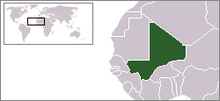LGBT rights in Mali
LGBT rights in Mali | |
|---|---|
 | |
| Status | Legal |
| Gender identity | No |
| Military | No |
| Discrimination protections | None |
| Family rights | |
| Recognition of relationships | No |
| Adoption | No |
Lesbian, gay, bisexual, and transgender (LGBT) persons in Mali may face legal challenges not experienced by non-LGBT residents. LGBT persons face stigmatization among the broader population. According to the 2007 Pew Global Attitudes Project, 98 percent[1] of Malian adults believe that homosexuality is a way of life that society should not accept, which was the highest rate of non-acceptance in the 45 countries surveyed.[2]
Law regarding same-sex sexual activity[]
Private, adult, consensual and non-commercial homosexuality is legal in Mali.[3]
Article 179 of the penal code punishes acts of "public indecency" with fines and imprisonment. This has sometimes been used against LGBT people who engage in public displays of affection.
While technically legal, the prevailing cultural and religious beliefs of most Mali citizens view same-sex sexual activity and non-traditional gender roles as immoral.
Discrimination protections[]
There are no anti-discrimination laws to protect the LGBT community from harassment and abuse on the basis of sexual orientation and gender identity.[4] Also, societal discrimination is widespread.[5]
Adoption and family planning[]
Article 522 of the "Code des Personnes et de la Famille", which was passed by the National Assembly on 2 December 2011 and subsequently signed into the law by the president of Mali, forbids same-sex couples from adopting children.[5][6][7][8]
Living conditions[]
According to Dr. Dembelé Bintou Keita, the director of ARCAD/SIDA, an HIV/AIDS organization in Mali that provides health care for men who have sex with men (MSM), Malian society is not tolerant to MSM. They "have no rights and certainly no right to claim their sexual orientation. All cultural beliefs towards MSM are negative." MSM are forced into bisexuality or underground sexual practices that put them at high risk of sexually transmitted and HIV infections. "Men who are attracted to other men are forced to get married so that they will not bring shame to the family ... but they still have men as sexual partners."[9]
The U.S. Department of State's 2011 human rights report found that,[5]
There were no publicly visible lesbian, gay, bisexual, and transgender (LGBT) organizations in the country. The free association of LGBT organizations was impeded by a law prohibiting association "for an immoral purpose"; in 2005 the then governor of the District of Bamako cited this law to refuse official recognition to a gay rights association.
Summary table[]
| Same-sex sexual activity legal | |
| Equal age of consent | |
| Anti-discrimination laws in hate speech and violence | |
| Anti-discrimination laws in employment | |
| Anti-discrimination laws in the provision of goods and services | |
| Same-sex marriage | |
| Recognition of same-sex couples | |
| Step-child adoption by same-sex couples | |
| Joint adoption by same-sex couples | |
| Gays and lesbians allowed to serve openly in the military | |
| Right to change legal gender | |
| Access to IVF for lesbians | |
| Commercial surrogacy for gay male couples | |
| MSMs allowed to donate blood |
See also[]
References[]
- ^ The number of adults surveyed in Mali was 700, yielding a margin of error of 4 percent with a 95 percent confidence level.
- ^ ""Pew Global Attitudes Project", pp. 35, 84, and 117" (PDF). Archived from the original (PDF) on 14 February 2010. Retrieved 3 December 2009.
- ^ "State-sponsored Homophobia: A world survey of laws prohibiting same sex activity between consenting adults", International Lesbian, Gay, Bisexual, Trans and Intersex Association, authored by Lucas Paoli Itaborahy, May 2012, p. 12 Archived 21 December 2012 at WebCite
- ^ "Mali LGBTI Resources | Rights in Exile Programme". www.refugeelegalaidinformation.org.
- ^ a b c "2011 Country Reports on Human Rights Practices: Mali, Bureau of Democracy, Human Rights and Labor, U.S. Department of State, pp. 17–18" (PDF).
- ^ "Le nouveau Code de la famille au Mali : une véritable régression pour les droits des femmes". Fédération internationale pour les droits humains.
- ^ ""Mali: promulgation du Code de la famille révisé", AFP, 20 January 2012".
- ^ "LOI N°2011 – 087 du 30 Décembre 2011 PORTANT CODE DES PERSONNES ET DE LA FAMILLE" (PDF). Archived from the original (PDF) on 12 May 2013.
- ^ "Asylumlaw.org" (PDF). 14 March 2018. Archived from the original (PDF) on 14 March 2018.
- LGBT rights by country
- Malian law
- LGBT rights in Africa
- Human rights in Mali
- Politics of Mali
- LGBT in Mali